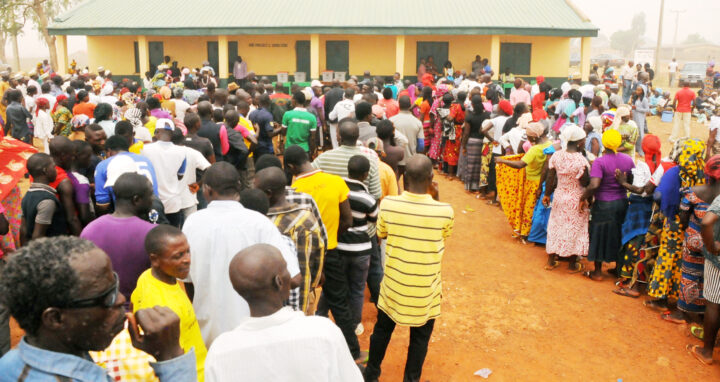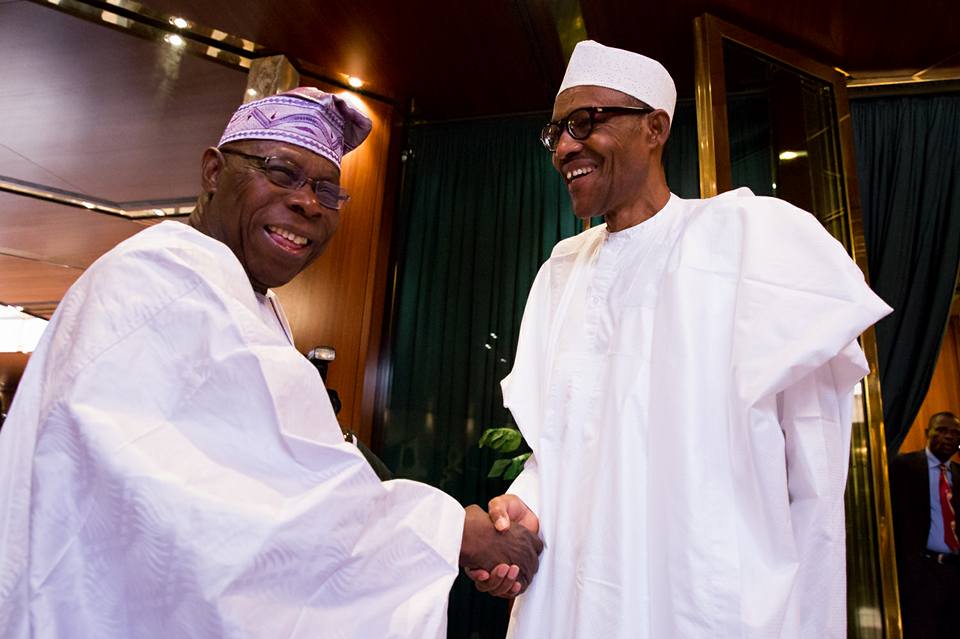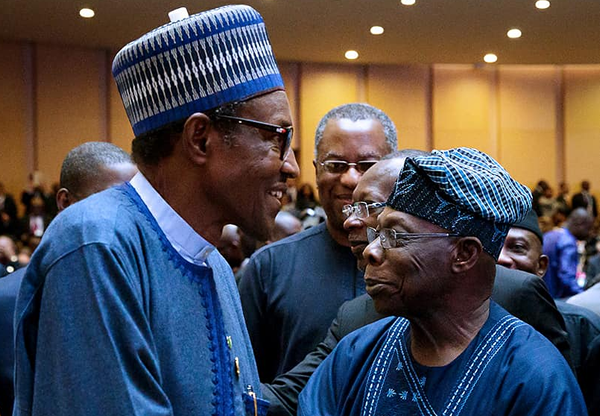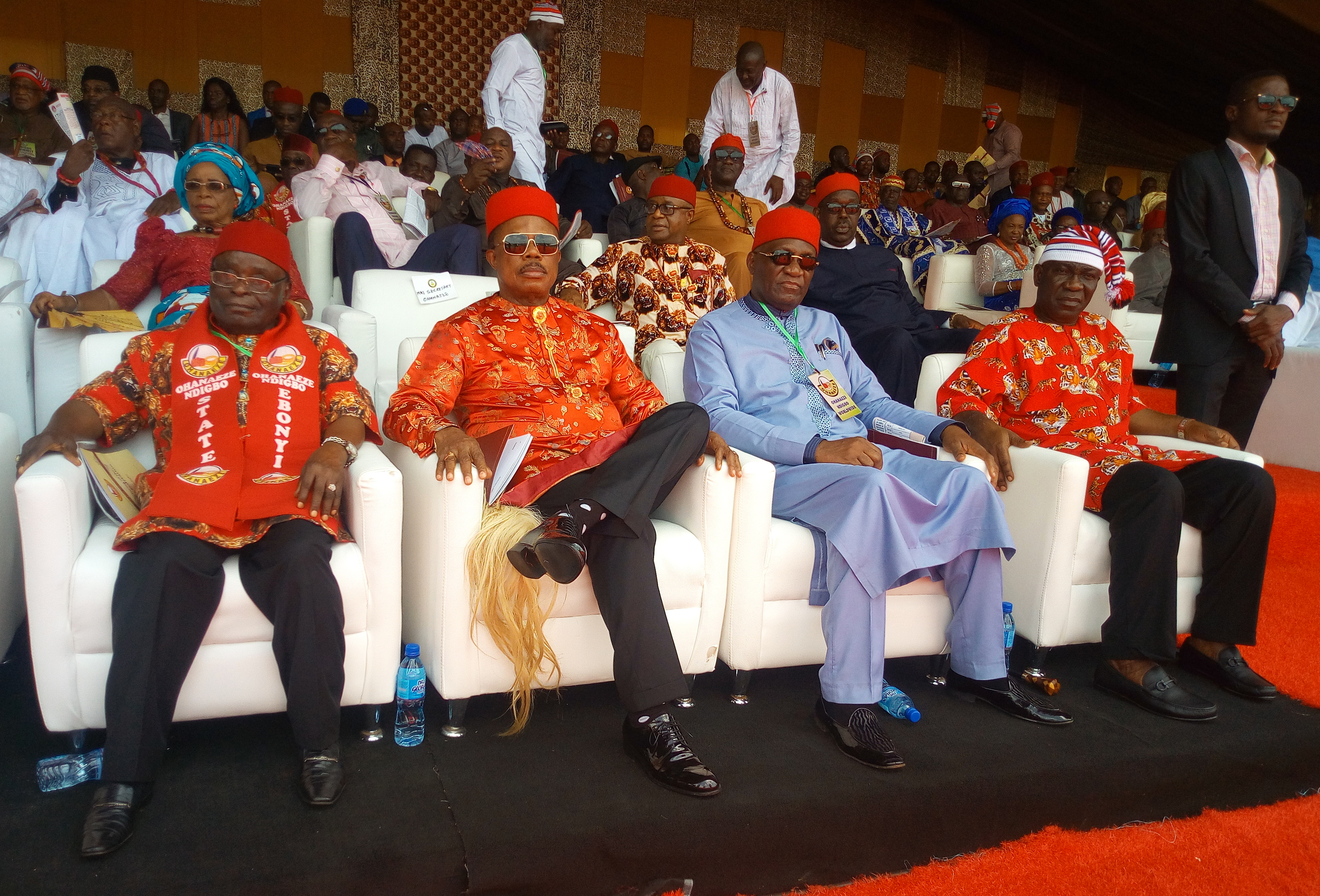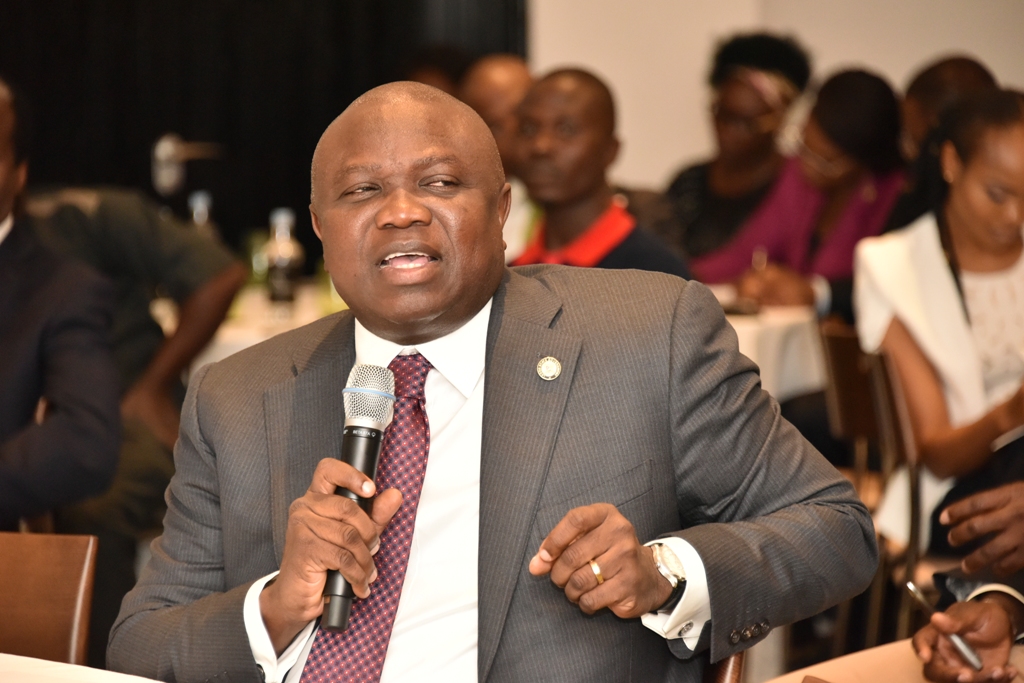PIC.43.VOTERS QUEUE TO CAST THEIR VOTES DURING THE GOVERNORSHIP AND STATE HOUSE
OF ASSEMBLY ELECTIONS IN JOS ON SATURDAY(11/4/15).
1942/11/4/2015/SAA/CH/NAN
Why are elections, which should be the celebration of democracy, war in Nigeria?
In societies where people are in tune with the ethos of democracy, elections are the brightest moments in the lives of the citizenry.
The basic definition of democracy is that it is the government of the people, by the people for the people. Periodic elections are the only way the mass are ever able to demonstrate their will any way they desire. Sometimes, they reward the hard work and fidelity of leaders to promises made by returning them or their parties to office. At other times, they make leaders restitute for failure to live up to the social contract with their people. Nigerians spoke boldly in this light when they sacked the 16-year reign of the Peoples Democratic Party in 2015.
However, like examinations, elections do not always produce the best of results since less than rational motives sometimes govern the decision of the electorate. And while democracy does not guarantee that the say of the majority will always be right, it donates the opportunity of having their way to them. Anyhow it goes, the majority are content with the fallout of their choices, no matter what it is. First, they are happy that a decision even if it eventually goes awry, is their own and most importantly, that in another circle of four years, they would be able to redeem. So, they look forward to elections with the expectation with which a pregnant woman looks forward to bringing forth.
Advertisement
Not so for Nigeria. Here, elections and electioneering have been and remain a period of unleashing of verbal and actual terror on society by the very people who strive for power.
There is always the argument that democracy is still in its infancy in Nigeria, but continues to perpetrate this justification for the indiscipline amongst Nigerian politicians that portends great danger for the country.
The human mind, when it allows nature take its course, is programmed to be amenable to reforms and continuous improvement. Unless men are stiff-necked and determined to continue to pursue the way of damnation, errors of the past should not only precipitate repentance, but also inspire reform.
Advertisement
So, elections in Nigeria, right from the First Republic, have always almost been with strife and bloodletting. One would imagine politicians and all Nigerians would indeed have learnt some lessons from the disaster the military disruption of the second and third republics turned out to be. But that may be going too far. Has Nigeria not had enough to even learn from since the return to civil rule in 1999?
Former President Olusegun Obasanjo, while in sight of the end of his tenure in 2007 said that the elections that would produce his successor would be a do-or-die affair. Obasanjo, ever impenitent of his appropriation of the right to dictate what is good and pleasurable to the interest of close to 200 million other Nigerians, insisted that the PDP must win the 2007 elections and the party did. But it was indeed a do-or-die affair for the country; only that neither Obasanjo nor any of the other combatants in the political war of words perished with the elections. Of course, a number of unidentified Nigerians lost their lives to the tension, violence and blatant manipulations that accompanied those elections.
But things grew worse with the 2011 elections. In spite of reform efforts made by the AttahiruJega-led Independent National Electoral Commission, the Geneva-based Human Rights Watch reported that 800 people were killed in three days of post-election violence in the country. Those whose pontification instigated the crisis are walking the streets today still in the business of political peddling.
Which is why even though Nigeria recorded no widespread deaths at the end of the 2015 elections, the preceding weeks took along with them an uncertain number of democratic martyrs.
Advertisement
Between December 2014 and February 2015 for instance, the National Human Rights Commission said 58 people were killed in election-related violence in the country.
Accompanying the widespread violence which extended to 22 of the 36 states of the federation was the anxiety that war might break out after the elections. Politics in the country never knew the level of hate speech and emotive outbursts that attended the 2015 elections. Tension arrested the souls of even the calmest of the people.
Hundreds left the country with their families while those who stayed back actually only anticipated the worst. Nigeria’s non-descent into violence is now attributed to either of the early acceptance of his loss of the election by President Goodluck Jonathan or even the love of the heavens for Nigeria, depending on the speaker’s disposition. Anyhow, Nigeria miraculously came back from the tether of a crisis that drew the attention of the whole world
But even as we prepare for the upcoming elections, it does not seem that Nigerians have learnt anything. Politicians understandably are caught up in the desperation to remain in office or take office from incumbents at all levels.
Advertisement
Party congresses, which should be the simplest of elections conducted by parties to build its structures is the latest source of discord in Nigeria at the moment. From Rivers to Kaduna to Kwara and Lagos, members of the All Progressives Congress have engaged in an intra-party scuffle that does not portend good for the party or even for the country.
The same do-or-die sense is what we get from gladiators in the Ekiti State governorship election coming up in less than two months. The ruling PDP in the state is determined to retain office while the APC has sworn that it must regain the seat it lost in 2014. The die is cast and no one can tell to what extent these political characters are ready to go in accomplishment of their ambitions.
Advertisement
Now, it is not that anything is wrong with ambition, but the ambition has often turned out to be nothing other than the mere desire to grab office and the benefit accruing from it. Elsewhere, the quest for political office is motivated by a cultivated passion for service.
So, it is easy to conclude that when the incentive for office is the desire to deploy competencies and talents for the welfare of people, there would be little or no desperation. Winners would be gracious in victory while losers would be gallant and not invest their being in frustrating those who are lucky for the moment.
Advertisement
But the average Nigerian politician is driven by hunger. Sometimes, it is a desire to fill their stomach and that of their families until near burst while it is sometimes the hunger to get back at some political opponents and such self-aggrandisement. This is why desperation rules politics in Nigeria and those who get into office are ready to stay there until they can no longer breathe.
Electoral observers on the bequest of the National Democratic Institute recommended as part of their report of the 2007 elections that: “Nigeria’s crisis of legitimacy can only be overcome by a strong commitment to political reform and concrete efforts to strengthen the country’s democratic institutions…; the Nigerian government and other public officials should undertake political reforms that could stimulate democratic consolidation. The Nigerian people must ensure that the failures of the electoral process noted during the 2007 elections do not go unaddressed.”
Advertisement
That 11-year-old counsel seems too over-fetched for the Nigerian politician who is not guided by any ideology or an interest in the electorate. But the people who have been the cannon fodder for the attainment of the ambition of selfish politicians should have a rethink and insist on their democratic rights. The onus for the redemption of Nigeria rests solely on the determination of the people and civil society organisations who really understand their roles. That these politicians would deliver good governance and make elections violence and pain-free without the insistence of the people is nothing but hope, elusive.
Twitter:@niranadedokun
Views expressed by contributors are strictly personal and not of TheCable.
Add a comment

